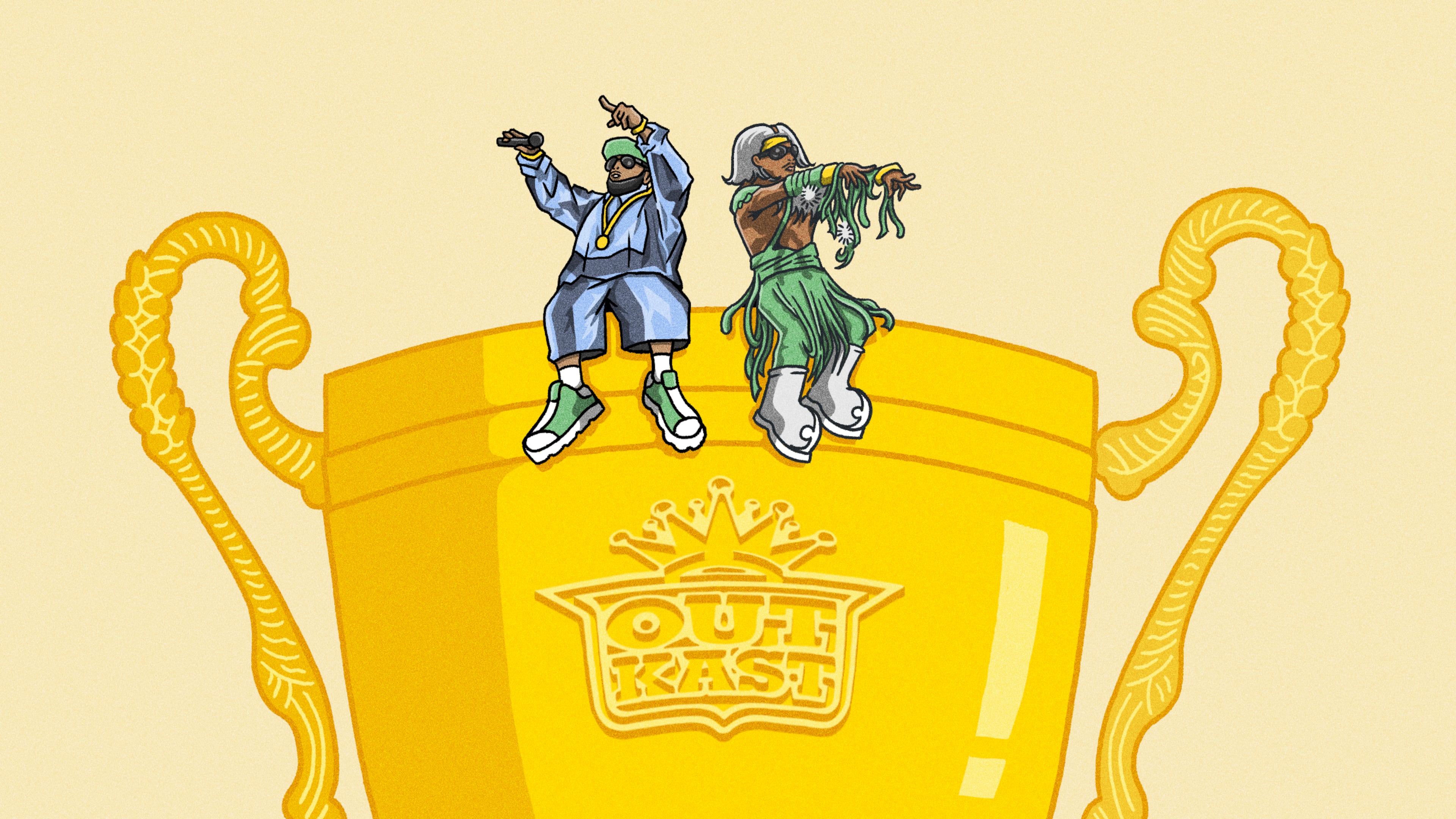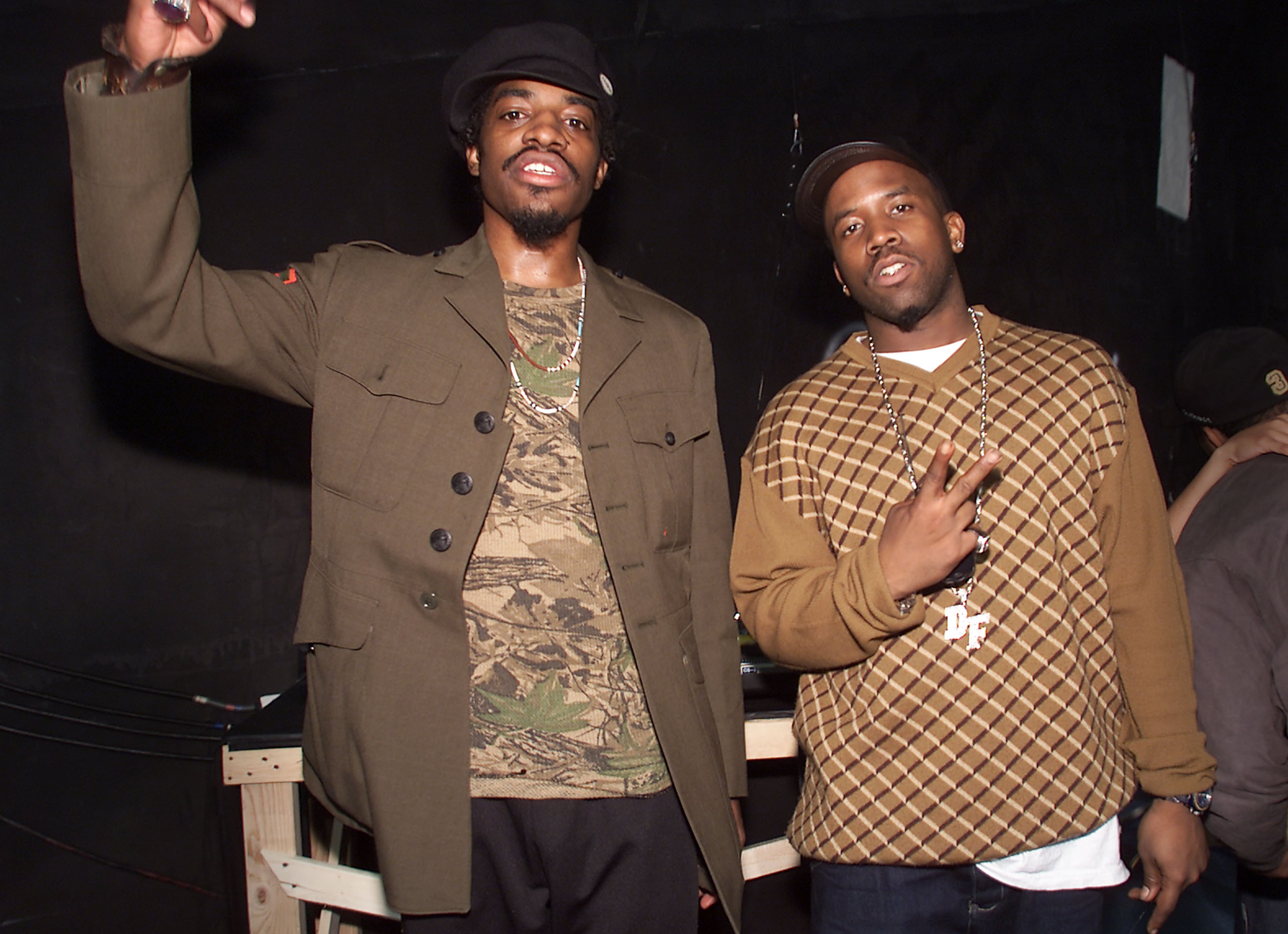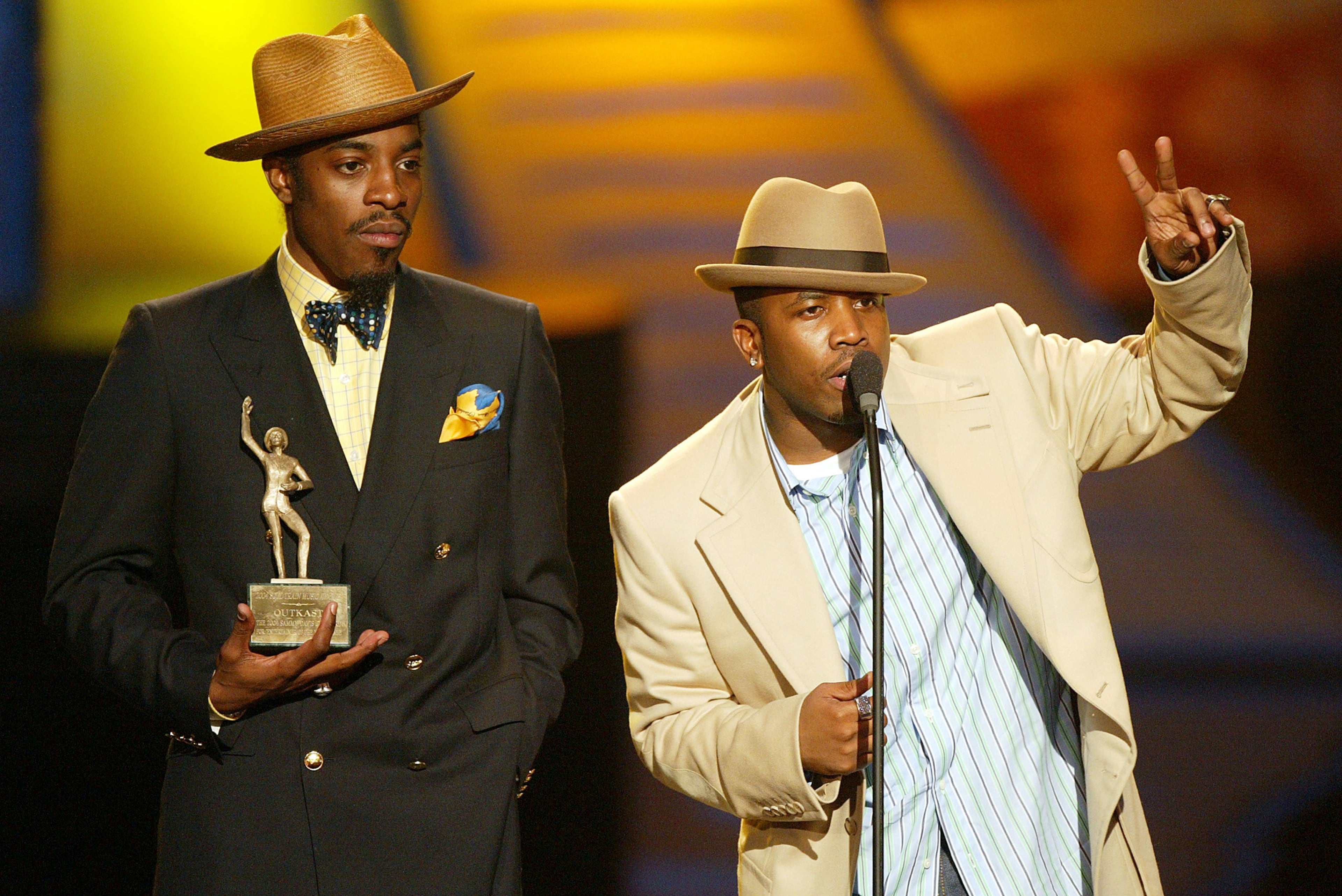Ain’t no debate: Outkast is the greatest rap group of all time

The whole world will be watching.
On Saturday, a room full of music’s most influential acts and industry folk will gather in Los Angeles’ Peacock Theater for the 2025 Rock & Roll Hall of Fame Induction ceremony.
There’s little doubt that those tuning in from Atlanta, via Disney+ livestream, will be listening for the names André “André 3000″ Benjamin, Antwan “Big Boi” Patton and Outkast. Native sons Killer Mike, JID and Sleepy Brown will be there to help induct the group. Salt-N-Pepa, aka “the First Ladies of Rap,” will be there, too. This moment will mark yet another coronation in the group’s career.
So, we’ll go ahead and say it: Outkast is the greatest rap group of all time.
Yes, we know declaring a G.O.A.T. for anything — LeBron or MJ? Drums or flats? Michael Jackson or Prince? — feels like a fruitless effort. For Outkast, there ain’t no debate. Theirs is a success story that spans three decades, six albums and generations, building a legacy unmatched in hip-hop.
Quantifying greatness can be very subjective. This is why we brought in a few trusted folks to help set the criteria, which involves lyrical ability, innovation, cultural impact, commercial and critical acclaim.
No surprise: Outkast checks every box.
A classic catalog
Let’s look at the numbers.
From the mid-’90s to early 2000s, Outkast put out an album — “Southernplayalisticadillacmuzik” (1994), “ATLiens” (1996), “Aquemini” (1998), “Stankonia” (2000), “Speakerboxxx/The Love Below” (2003), “Idlewild” (2006) — almost every two years.
During that run, they didn’t just make new projects. Like George Lucas with “Star Wars” or J.R.R. Tolkien’s “Hobbit” and “Lord of the Rings” series, they built entire worlds for fans to explore, expanding the scope with each new release. They evolved, challenging themselves, listeners, hip-hop and the status quo.
Fueled by the guidance and production of mentors Organized Noize, “Southernplayalisticadillacmuzik” introduced the country to Atlanta life. Listeners were invited to the party on “Ain’t No Thang,” “Hootie Hoo” and the title track. Yet, on tracks like “Call of da Wild,” “Git Up, Git Out” or the “Welcome to Atlanta” interlude, Outkast and their Dungeon Family collective challenged the idea of their hometown being “the Black mecca.” The album sold 1 million records.
Consistent themes continued to crop up in Outkast’s output throughout the early aughts, according to Outkast scholar Regina Bradley, an associate professor of English and African diaspora studies at Kennesaw State University.
“How do I view the world around me? Is voting really the move? All these things that are definitive of Southern Black identity, definitive of Southern Black consciousness, they were questioning it,” she said.
Bradley, also the author of “Chronicling Stankonia: The Rise of the Hip-Hop South” and editor of “An Outkast Reader: Essays on Race, Gender and the Postmodern South,” concurs that André and Big Boi are No. 1 based on cultural impact alone.
She points out that the group was still channeling their “sonic genealogies” stemming from the Dungeon Family tree. Heavily influenced by the jazz, funk, blues and church backgrounds of mentors Ray Murray, Sleepy Brown and Rico Wade, the group learned to push themselves.
On “ATLiens,” André and Big Boi weren’t content to simply lean back in their Cadillacs and cruise. After getting booed at the 1995 Source Awards, they had a chip on their shoulder, causing them to double down on their rap prowess. They got into production with “ATLiens,” “Wheelz of Steel,” “Elevators,” “Ova da Wudz” and “E.T. (Extraterrestrial).” The album sold 2 million records.
By the time they released “Aquemini,” their mainstream breakthrough, the duo started to take full control of their creative output, writing, producing and arranging. Led by singles “Rosa Parks” and “Skew It On the Bar-B,” the album dug into themes of identity (“Return of the G”), fearing technology (“Synthesizer”), pitfalls of getting lost in the sauce of Atlanta nightlife (“SpottieOttieDopaliscious”), drug addiction, sex, love and Black liberation. It sold 3 million copies.
“Stankonia,” named after a studio space the group purchased from Bobby Brown, was their above-ground Dungeon to call their own. With Mr. DJ, André and Big Boi’s production trio, Earthtone III, became a younger but still experimental version of their mentors on their fourth album. From the frenetic “B.O.B. (Bombs Over Baghdad)” to the infectious “baby mammas, mamas” ode, “Ms. Jackson,” taking musical flight risks and still landing the plane was all part of it. “Stankonia,” which just celebrated 25 years, sold 5 million copies.
It was how they approached every project before and after.
“Experimenting in sound — did that. Creating new language — did that. It’s always stepping their game up. You listen to their discography, it doesn’t get worse. It gets more experimental,” Bradley said.
This continued with the release of “Speakerboxxx/The Love Below,” which featured separate efforts by Big Boi and André that were packaged together. It became the highest-selling rap album of all time with 13 million records sold, backed by Big Boi’s “The Way You Move” and Andre’s “Hey Ya!” Despite only appearing on a few tracks together (“GhettoMusick,” “Roses”), it’s an album that never gets enough credit for the individual efforts of both men, who fully immerse themselves in past and present influences.
And you didn’t think we’d skip over “Idlewild,” did you? OK, it was a companion album for their film of the same name. It’s probably known as the least cohesive entry in the Outkast catalog, despite love for singles “Mighty O,” “Morris Brown,” “Idlewild Blue” and “Hollywood Divorce” featuring prime Weezy. Outkast’s last studio album sold 1 million copies and still cooks.
Lyrical ability
If there was a Mt. Rushmore for rap lyricists, the two dope boys in a Cadillac would both be etched in its stone, says veteran journalist Rob Markman, now vice president of music and content at Genius, a site that dubs itself “the world’s biggest music encyclopedia” with annotated song lyrics.
“I think Big and André are both alpha MCs, top-tier, elite MCs,” said Markman, a New York native, who said that Outkast — just ahead of Run-D.M.C. — sits atop rap’s throne.
Growing up in Brooklyn, Markman remembers first seeing Outkast when the video for their 1993 single “Player’s Ball” came on BET’s “Rap City.” Outkast reminded him of conscious Bay Area group Souls of Mischief, who’d just released their classic, “93 ‘til Infinity.”
He’d never been to Atlanta but felt transported there via the group’s 1994 debut album, “Southernplayalisticadillacmuzik.” The storytelling, vivid imagery, slang and production stuck out. He was hooked.
Two years later, the group would drop “Elevators,” which included the very southern chorus, “Me, and you, yo mama and yo cousin, too.” Markman remembers thinking how “weird” or left of center it sounded from previous releases. Listening, he realized then what would continue to be true of Outkast’s trajectory: “They never settled musically.”
Whether it’s Big Boi’s classic boast of being “cooler than a polar bear’s toenail” on the song “ATLiens” or both emcees going bar for bar with Wu-Tang Clan’s Raekwon on “Skew It on the Bar-B” from “Aquemini,” Outkast always exceeded lyrical expectations.
“I just don’t think that there’s any group who has been more committed to raising the ceiling of creativity for hip-hop than Outkast has been,” Markman said.
Commercial, critical, cultural impact

In all, Outkast has sold more than 23 million records, the most of any rap group.
“Speakerboxxx/The Love Below” won album of the year at the 46th Grammy Awards in 2004, the first time a rap group won the award.
Two years ago, celebrating the 50th anniversary of hip-hop, Billboard put Outkast in the top spot for its list of best rap groups. They ranked ahead of Wu-Tang Clan, N.W.A., A Tribe Called Quest and Run-D.M.C.
But the accolades don’t tell the entirety of Outkast’s cultural impact.
Hip-hop cultural historian and collector Larry “Nuface” Compton says two things kept him in Atlanta after he moved from Detroit to attend Clark Atlanta University in 1996: Freaknik and Outkast.
Known for his massive collection of memorabilia, artifacts, vinyls, CDs and cassettes, the first autograph Nuface got in Atlanta came from Oukast. They signed his copy of “Elevators” on cassette.
Nuface calls Outkast the greatest group of all time but also has EPMD, N.W.A. and Run the Jewels up there. “I don’t care if you don’t think they’re the greatest group of all time; they are a blueprint,” he said of Outkast.
He points to artists such as Kendrick Lamar, Janelle Monáe and Tyler, the Creator, who’ve all taken pages out of André and Big Boi’s playbooks.
Markman mentioned the song “Return of the ‘G,’” wherein André and Big Boi take exception to rumors about their evolving fashion choices, sound and André’s sexuality.
“They taught a generation, no matter what they say about you, no matter how different you are, no matter how much of an outcast you are, man, it’s still a place for you in this world,” he said, adding that the group’s boldness gave runway to openly gay artists such as Lil Nas X and Frank Ocean.
Outkast channeled sonic and visual cues from Organized Noize, Parliament-Funkadelic, Prince and James Brown, making them their own, Bradley said. From classic album covers and CD art to their forays into fashion’s quirkiest spaces, Outkast’s influence is felt and seen through acts such as JID, Earthgang and even Young Thug.
“I think in their career, they transcended Atlanta. You can’t say Outkast and regional in the same sentence. These guys are worldwide,” Markman said.
Rock Hall adds to lore

Along with Salt-N-Pepa, who are receiving a musical influence award, Outkast is set to join Grandmaster Flash and Furious Five, Run-D.M.C., Beastie Boys, Public Enemy, N.W.A. and A Tribe Called Quest as the only rap groups inducted into the Rock & Roll Hall of Fame. They will be the first from the south to claim a spot.
They got in on their first ballot, which is worth mentioning but not harping on because the Rock Hall didn’t recognize hip-hop artists until inducting Grandmaster Flash and the Furious Five as performers in 2007. It took the latter, Beastie Boys and A Tribe Called Quest three ballot appearances. N.W.A. was on the ballot four times.
Public Enemy and Run-D.M.C. both had one ballot appearance.
Why does this matter? What does it add to the lore?
Well, for one, this comes just over 30 years after André 3000 put the world on notice by barking, “The south got something to say!” Back then, it was jeers from peers who didn’t understand; now it’s universal cheers because the south hasn’t looked back. The city’s ascension within rap and hip-hop is in direct correlation with Outkast’s rise.
In Atlanta, Nuface says the recognition is like winning the bid for the Olympics all over again. He jokes that Outkast is the city’s winningest team and, like any champion, should be honored with a parade.
“It’s like a gold medal for if you were raised in the south and you lived on Headland and Delowe and you knew where the Dungeon was at, those are bragging points for us because it’s like we knew them,” he said.
Bradley and Markman will be watching, too.
For the former, it’s a chance to spark dialogues about the group beyond classrooms like hers. “I’m even more excited that people are putting respect on their name and giving them not just fandom, but critical engagement,” Bradley said.
For the latter, the Rock Hall induction adds validation to this larger case for Outkast’s No. 1 spot in rap music and hip-hop culture. All the evidence is there.
“There will, of course, be pushback because we love to debate. We love to argue. I think truly, if everybody is honest with themselves, no matter what city you are in, you may have your favorite, but you can’t deny Outkast greatness in their place in this,” Markman said.
So, how about that parade?
